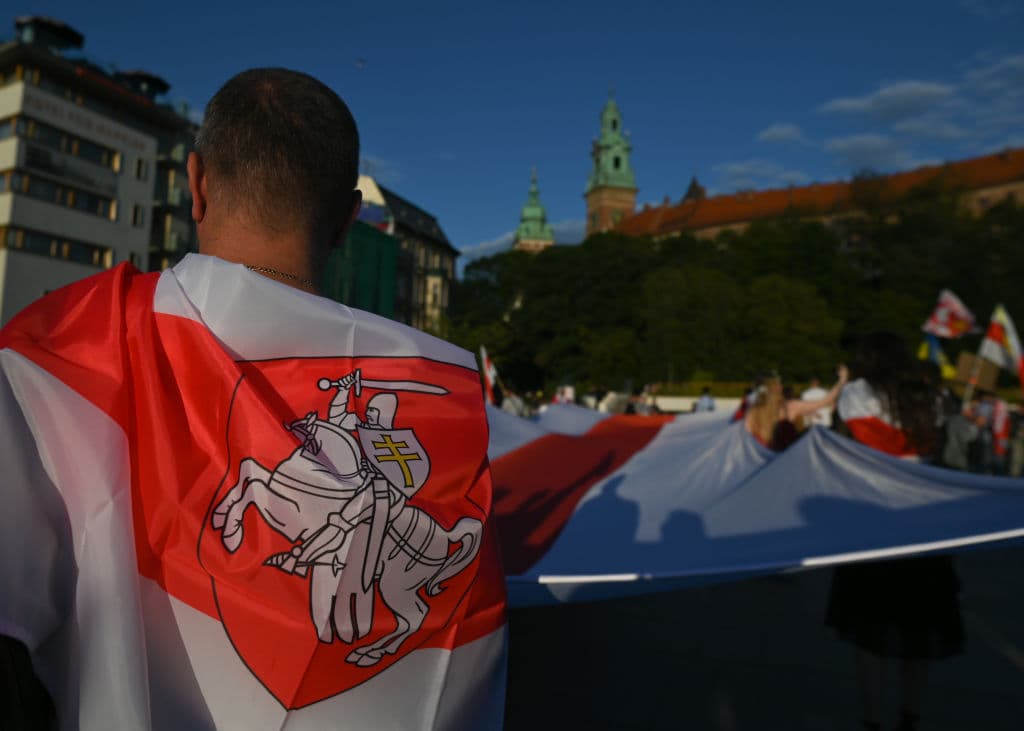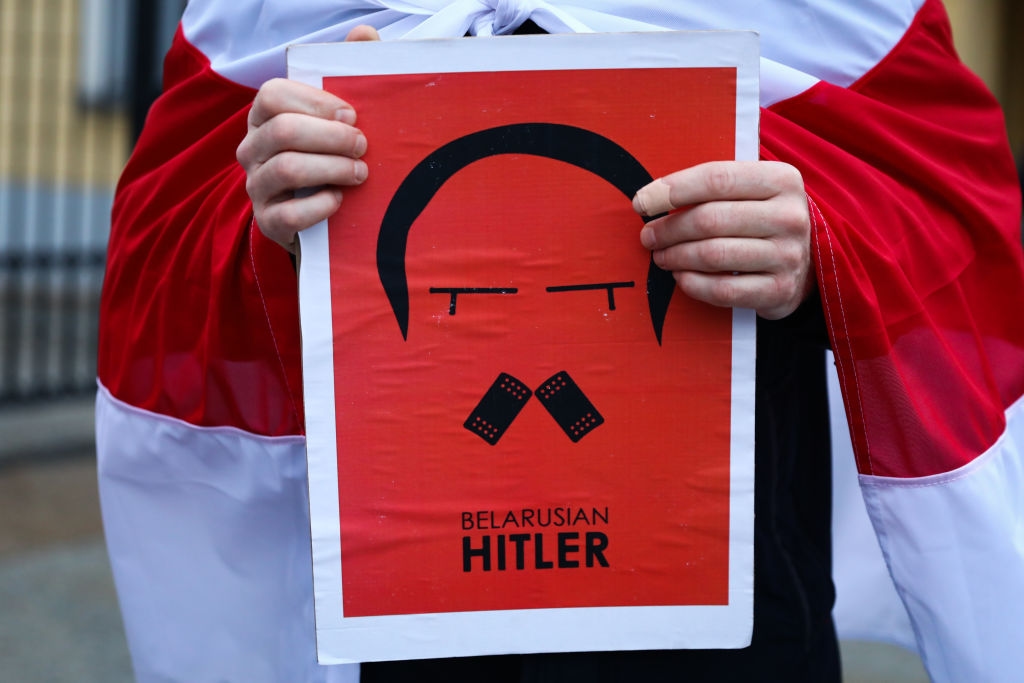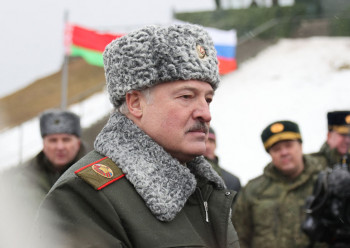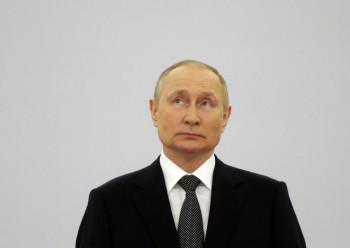Belarus Weekly: Russia increases rocket attacks from Belarus after Ukraine's Independence Day

The number of Russian rockets hitting Ukraine from Belarus substantially increased after Belarusian autocrat Alexander Lukashenko “congratulated” Ukraine on its Independence Day.
Meanwhile, Belarusian aircraft had been re-equipped to carry Russian nuclear weapons, while the newly created Belarusian territorial defense held exercises in Minsk.
Lukashenko expressed regret that the Belarus constitution adopted on Feb. 27 did not abolish presidential elections.
BYPOL, the organization of exiled Belarusian law enforcement, is recognized as a terrorist organization.
Books by Belarus’ only Nobel Prize laureate are being checked for extremism.
Human rights center Viasna reports that the riot police continue to beat political prisoners, while Ukrainian lawmakers launch a petition saying that Belarusians and Russians are equally responsible for the war.
Lukashenko claims Belarusian aircraft refurbished to carry nuclear weapons
On Aug. 26, during his public speech, Lukashenko claimed that Belarusian SU-24 tactical bombers had been re-equipped to carry nuclear weapons, but apparently confused the type of aircraft as SU-24 have been officially withdrawn from service in 2012.
The idea of Belarus having nuclear arms was first brought up at a meeting between Lukashenko and Russian President Vladimir Putin on June 25 as a response to NATO drills carried out near the country’s borders after Russia launched its full-scale war.
Most likely, Belarus’ SU-25 aircraft are now capable of carrying nuclear weapons. According to the Belarusian Hajun project, re-equipment of SU-25 is technically possible, although Belarusian pilots have no experience in handling that kind of charge. Additionally, the group argued that Russians can station nuclear arms in Belarus directly rather than empowering Lukashenko with such a tool.
Territorial defense drills take place in Minsk
On Aug. 30, the Belarusian Ministry of Defense held exercises for the newly established territorial defense units. Residents reported hearing gunshots and explosions and saw trenches and cars with Russian license plates.
First Deputy Defense Minister Viktor Gulevich said around 300 reserve military personnel were called up to participate in the drills near Minsk.
In June, the Belarusian military announced the drills of territorial defense units and the creation of “people’s militias.” The procedure and requirements for joining the Belarusian people’s militia and the territorial defense remain unclear. Local journalists attempted to enlist to investigate the matter but were rejected.
Russia bombs Ukraine from Belarusian territory days after Lukashenko’s Independence Day ‘well-wishes’
Despite Lukashenko saying on Ukraine’s Independence Day that he wishes Ukrainians a “peaceful sky,” Russian forces bombed Ukraine from Belarusian territory the very same day.
On Aug. 24, Russian forces bombed Ukraine’s Khmelnytskyi Oblast from Belarusian territory. According to Belarusian watchdog Belarusian Hajun, the missiles were launched from Belarus’ Homel region.
According to Belarusian Hajun, Russian missiles fired at Ukraine on Aug. 28 were also launched from Belarusian territory.
Lukashenko falsely claimed on Aug. 19 that no one would “bomb Ukraine from Belarusian territory.”
Belarus opens criminal investigation into Ukrainian MP for ‘threatening’ Lukashenko
Belarus’ Prosecutor General’s Office initiated a criminal investigation into lawmaker Oleksiy Honcharenko for “threat of violence” against Lukashenko and “discrediting the Belarus state.”
In response to Lukashenko’s “well-wishes” on Ukraine’s Independence Day, Honcharenko said that Lukashenko will “hang from a pole on the next Ukrainian Independence Day.”
Lukashenko’s regime is a co-belligerent in Russia’s full-scale war against Ukraine, having facilitated the transit of Russian troops and the launching of weapons from Belarusian territory.
Regarding Lukashenko’s claim that he wishes Ukraine a “peaceful sky,” Ukraine’s Defense Ministry said missiles were again fired from Belarus.
Lukashenko regrets not allowing All-Belarusian People’s Assembly to elect president
During a meeting on the “civil society development” on Aug. 30, Lukashenko said he regretted that Belarus’ new constitution, which was pushed through on Feb. 27, did not stipulate the election of the country’s president by the All-Belarusian People’s Assembly, saying that “elections always destabilize the situation.”
The All-Belarusian People’s Assembly is comprised of around 5,000 representatives, mainly officials, that have been selected through obscure means by Lukashenko’s regime to fabricate legitimacy surrounding the regime’s decisions.

A protester with a place card of autocrat Alexander Lukashenko being compared to Adolf Hitler is seen in Bialystok, Poland, on Nov. 21, 2021. (Getty Images)
Lukashenko also noted that other countries, such as China, elect the head of state through different means – notably, through an elected National People’s Congress.
The Assembly was created by Lukashenko prior to Belarus’ fraudulent 2020 presidential elections.
The Assembly is largely viewed as a means through which Lukashenko might retain control of the country.
Belarusian authorities label BYPOL ‘terrorist’ organization
Belarus’ Supreme Court labeled BYPOL, an association of exiled former Belarusian law enforcement officers that oppose Lukashenko’s regime, a “terrorist organization.”
Belarus’ Prosecutor General’s Office said on Aug. 31 that it initiated the hearing, which also marked the Situational Analysis Center and the Victory Mobilization Plan with the same title.
Belarusian authorities cited the alleged “formation of radical ideas in society and pushing citizens to conduct extremist activities aiming to change the (country’s) constitutional order” as justification for their decision.
The organization, founded in 2020 amid the mass protests that followed Lukashenko’s fraudulent presidential election win, openly criticizes Lukashenko’s regime and has been forced to operate in exile.
BYPOL member Aliaksandr Azarau has recently been appointed the shadow cabinet member in Belarusian opposition leader Sviatlana Tsikhanouskaya’s executive body.
Azarau said the Supreme Court’s decision would not change the organization’s course.
Belarusian authorities review Nobel Prize laureate’s books for ‘extremist content’
Belarusian authorities are reportedly assessing books published by Sviatlana Aleksievich, Belarus’ only Nobel Prize in Literature laureate, for “extremist content.”
Aleksievich is known for her non-fiction works “The Unwomanly Face of War,” which chronicles the experiences of women in the Soviet Union during World War II, and “Chernobyl Prayer,” which documents the stories of the Chornobyl disaster survivors. She was awarded the 2015 Nobel Prize in Literature.
Lukashenko’s regime announced in July that it had marked several books, including “1984” by George Orwell, as containing “extremist content.” While Aleksievich’s works were not labeled as such, Belarusian schools were instructed in June to remove her books from their shelves.
Aleksievich was forced into exile in 2021 due to her open criticism of Lukashenko’s regime and Belarus’ Soviet past.
In 2021, Belarus’ Supreme Court dissolved Belarusian PEN, an association of writers headed by Aleksievich.
Riot police beat political prisoners in Belarusian detention facility
The administration of a detention center in Krupki, a village in Belarus’ Minsk region, called in riot police to beat political prisoners on Aug. 23, according to human rights watchdog Viasna.
Political prisoners serving sentences at the facility were reportedly taken into a room, beaten, and forced to chant “I love Lukashenko, I love the riot police.”
Human rights groups say there are currently 14 political prisoners at the facility.
There are numerous reports of political prisoners facing widespread abuse at detention facilities across Belarus – they often experience solitary confinement, are forbidden from corresponding with their families, and are marked with yellow tags indicating so-called “extremist involvement.”
Ukrainian lawmakers draft bill calling to recognize Belarus as sponsor of terrorism
A draft bill was registered on Aug. 31 in the Ukrainian parliament set to recognize Belarus as a state sponsor of terrorism. If adopted, Ukraine would appeal to the UN, EU, and NATO to join the initiative.
Granting Belarusian territory to Russian troops to invade Ukraine and continuous rocket attacks from the country's territory made Belarus a co-belligerent in Russia’s full-scale war against Ukraine, according to four lawmakers who co-authored the bill.
There is no official procedure for recognizing a state as a sponsor of terrorism.
The U.S. list of countries sponsoring terrorism includes Iran, Syria, Cuba, and North Korea and entails an arms embargo, trade restrictions and suspension of foreign aid, and secondary U.S. sanctions for the entities that keep trading with the countries recognized as sponsors of terrorism.
Russia has not been added to the U.S. list, since secondary sanctions could affect the EU, which continues to trade with Russia.











